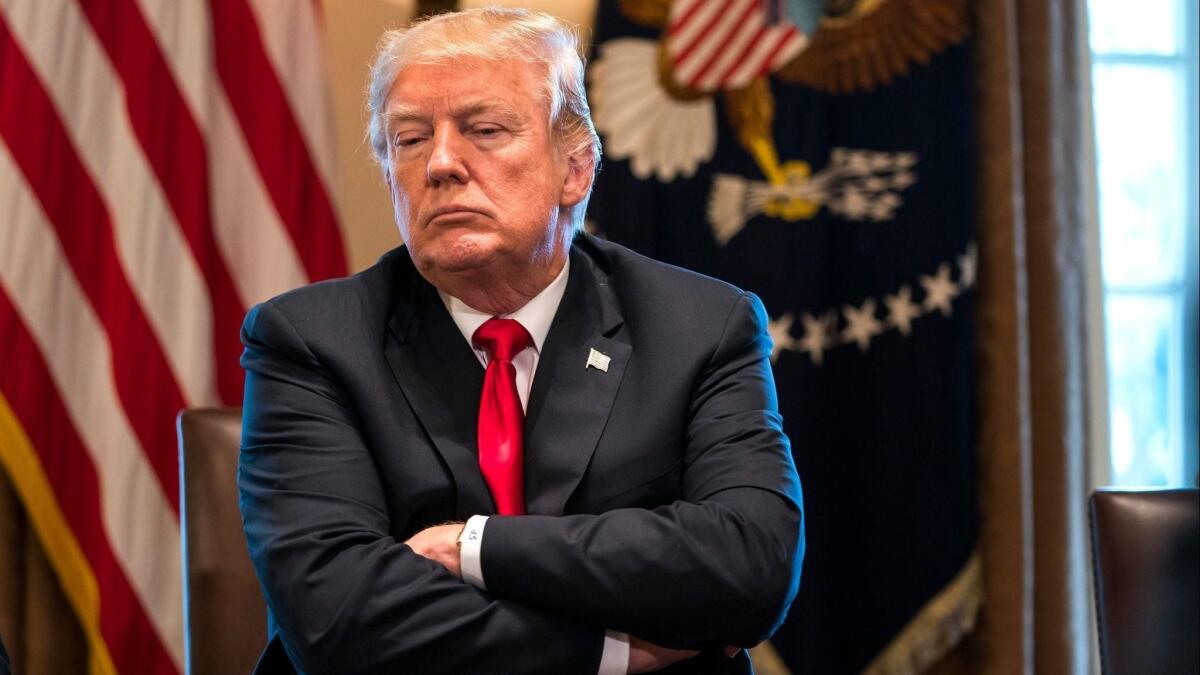Editorial: Trump loves tariffs. Congress needs to rein him in

- Share via
The Trump administration recently dropped its threat to jack up the sweeping tariffs it previously imposed on $200 billion worth of imported Chinese goods, which should come as a relief to the many U.S. businesses and consumers that are paying them. On the other hand, President Trump may be moving closer to slapping tariffs on imported cars, trucks and auto parts, despite widespread opposition to the move — including from the Big Three U.S. automakers.
Simply put, Trump likes tariffs. They give him a bigger stick in trade talks with countries whose economies are sustained by exports, such as China, much of Europe and South Korea. And he has wide latitude to levy them, thanks to the power Congress has entrusted to the president since 1934.
But 20th century lawmakers probably did not envision a chief executive using tariffs the way Trump has. And now that Trump is wielding import duties like a club on U.S. allies and adversaries alike, current members of Congress are trying to take some of that power back.
Trump’s contorting of the law on national-security-based tariffs is just one of several ways he has stretched the limits of presidential power.
In particular, they are seeking to pull back some of the authority Congress granted the White House in 1962, at the height of the Cold War. The main purpose of the law was to let the president strike trade deals that cut tariffs and other trade barriers, but it also gave the president authority to raise trade barriers if he deemed it necessary to protect national security.
Prior to Trump, this power was invoked only twice, in both cases to block crude oil imports: first from Iran, after the U.S. Embassy in Tehran was seized in 1979, and then from Libya in 1982, in response to that country’s support for terrorism.
Trump, however, has used the national-defense rationale as a flag of convenience, imposing tariffs with only a fanciful connection to U.S. security interests. Last year, he slapped national security tariffs on steel and aluminum imports from around the globe, even though these metals have been coming into the U.S. in large part from such reliable allies as Canada, Mexico and Australia. Worse, the tariffs have helped a relatively small number of U.S. steel and aluminum manufacturers at the expense of a far larger number of companies that need those metals for their products. According to the U.S. Chamber of Commerce, for every one job producing metals, there are 45 in industries that use them.
And now Trump is considering an as yet unreleased report from the Commerce Department on whether to impose national-security tariffs to protect U.S. manufacturing of motor vehicles and parts. The three options reportedly laid out by the Commerce Department are a 25% tariff on all imports, a 10% tariff on all imports, or tariffs just on selected types of vehicles and parts. The maximalist option would increase the cost of imported cars by thousands of dollars; light trucks are already covered by a 25% tariff imposed in the 1960s.
As we’ve noted before, slapping tariffs on imported vehicles and parts would inflict widespread collateral damage on U.S. companies, workers and consumers. Supply chains are global now, so even cars and trucks made in the United States may rely on imported components. And like a sales tax, tariffs ultimately raise costs for consumers, depressing demand. That’s why U.S. automakers, whose interests are supposedly being protected here, hate the idea. So do farmers and other U.S. exporters, because Trump’s tariffs have invariably prompted our trading partners to retaliate with levies on U.S. products.
Enter the Fray: First takes on the news of the minute »
And so, evidently, does a sizable and bipartisan group of senators. They have introduced two competing bills — S. 365, by Sen. Rob Portman (R-Ohio) and eight other senators, and S. 287, by Sen. Pat Toomey (R-Pa.) and 11 others — that would make it significantly harder for presidents to use national security as a pretext to impose tariffs or other trade barriers. Toomey’s proposal would require Congress to approve national-security-based tariffs in advance, which may be too draconian even with the current president in mind; Portman’s proposal would simply give Congress the power to quickly revoke such actions.
Similar measures have been introduced by bipartisan groups in the House.
Trump’s contorting of the law on national-security-based tariffs is just one of several ways he has stretched the limits of presidential power (see, for example, his declaration of a bogus emergency at the border in order to spend more money on his wall project than Congress provided). It’s good to see Republicans start standing up to Trump’s excesses on trade. It would be a shame, however, if they stopped there.
Follow the Opinion section on Twitter @latimesopinion and Facebook
More to Read
A cure for the common opinion
Get thought-provoking perspectives with our weekly newsletter.
You may occasionally receive promotional content from the Los Angeles Times.









